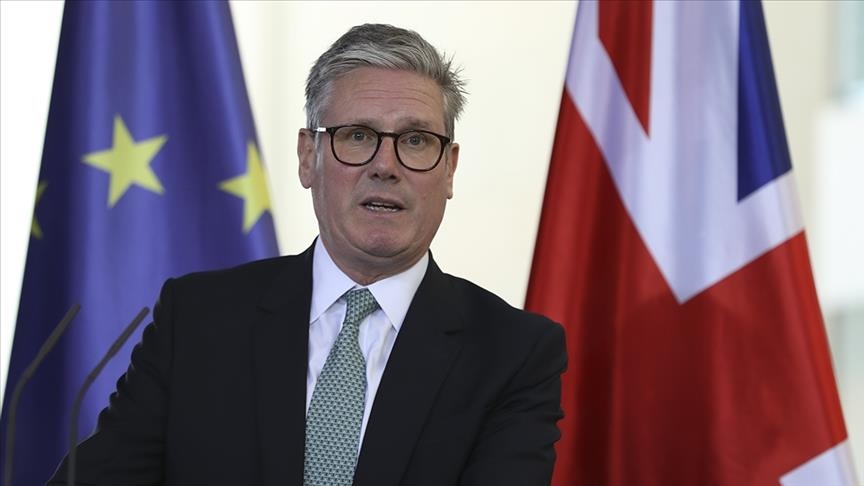2025 and beyond: Can Labour mend post-Brexit damage to UK-EU ties?
Keir Starmer’s campaign promises included improving trade and security cooperation with the EU, and vows to alleviate Brexit-related disruptions

- ‘Achieving closer ties will require careful navigation of regulatory alignment challenges and political sensitivities on both sides,’ says Cevat Giray Aksoy of King’s College London
LONDON
British Prime Minister Keir Starmer has embarked on a mission to reset the UK’s relations with the EU following Labour’s resounding victory in July’s general election.
Despite efforts to build bridges with Brussels and key European capitals, progress has been incremental at best, as the UK continues to grapple with the economic and political fallout from Brexit.
Starmer’s campaign promises included improving trade and security cooperation with the EU, and vows to alleviate Brexit-related disruptions.
However, his government has firmly ruled out a new referendum or rejoining the EU, aiming to strike a delicate balance between rebuilding ties with Europe and appeasing Brexit supporters within his party.
Tentative start to resetting relations
Starmer’s visit to Brussels in October underscored both the potential and limitations of his approach.
During talks with European Commission President Ursula von der Leyen and other EU leaders, the British premier emphasized the need for strengthened cooperation.
Yet, the resulting joint statement was notably vague, focusing on shared commitments to Ukraine and the Middle East while offering little concrete progress on trade or regulatory issues.
The two sides did agree to hold regular joint summits, a symbolic gesture aimed at fostering dialogue.
Complicating matters, the EU has shown reluctance to reopen the Trade and Cooperation Agreement (TCA), which took five years to negotiate under Starmer’s predecessors.
Brussels has expressed frustration over what it perceives as the UK’s incomplete implementation of the existing deal.
For example, a European Commission proposal to introduce free travel for individuals aged 18 to 30 between the UK and EU was rebuffed by the former, highlighting the delicate nature of the ongoing negotiations.
Brexit’s lingering economic toll
The economic consequences of Brexit continue to cast a long shadow over Starmer’s premiership.
Recent research from the London School of Economics (LSE) revealed a £27 billion ($33.8 billion) reduction in trade with the EU during the first two years after Britain’s exit.
Smaller businesses have borne the brunt of this decline, with thousands halting trade due to new regulatory barriers.
The LSE’s Centre for Economic Performance described these barriers as a “disaster” for small enterprises, noting a 6.4% drop in British exports and a 3.1% decline in imports by the end of 2022.
This reduction in trade volumes has exacerbated the UK’s sluggish economic growth. Since the TCA came into effect, British goods exports have fallen by approximately £30 billion, with non-tariff barriers hitting smaller firms hardest.
Incremental steps toward closer ties
Labour’s decisive victory in July reflected widespread dissatisfaction with the previous Conservative government’s handling of the economy.
Rising inequality, a deepening housing crisis, and stagnant wages left voters disillusioned. The fallout from Brexit further compounded these issues, with declining exports and disrupted supply chains creating additional strain.
Starmer’s economic strategy focuses on increased public investment, expanded public ownership in key sectors, and tax reforms aimed at addressing inequality.
His government has signaled a commitment to reducing Brexit-related disruptions and fostering economic stability, while prioritizing cooperation with European partners to drive growth.
Experts believe a closer UK-EU relationship is possible by 2025, though progress will likely unfold through gradual steps rather than sweeping reforms.
Cevat Giray Aksoy, a lecturer at King’s College London and associate director of research at the European Bank for Reconstruction and Development (EBRD), sees mitigating economic disruptions from Brexit as a foundation for improving ties.
“For instance, the Labour Party has signaled its intention to improve trade relations and reduce non-tariff barriers, which have significantly affected UK exports,” Aksoy explained.
Rejoining EU research initiatives such as Horizon Europe and pursuing agreements to facilitate trade in services could also be pivotal, he added.
“Considering that services account for around 80% of the UK economy, improving access to EU markets would provide a substantial boost to economic growth,” he said.
“However, achieving closer ties will require careful navigation of regulatory alignment challenges and political sensitivities on both sides.”
Aksoy emphasized that Labour’s priority is to improve relations with the EU to mitigate Brexit-related disruptions and support economic stability.
“These policies signal a shift toward greater state involvement and a focus on repairing existing economic challenges while fostering international cooperation,” he said.
Turning the corner on Brexit
While Starmer’s overtures to Europe mark a departure from the confrontational stance of recent years, significant hurdles remain.
The EU’s hesitancy to renegotiate the TCA reflects lingering mistrust, while internal divisions within the UK over Brexit continue to complicate matters.
Navigating regulatory alignment and addressing political sensitivities will be critical as the UK seeks to repair its fractured relationship with the EU. The Labour government must also balance domestic expectations with the practicalities of international diplomacy.
For now, Starmer’s promise to “turn the corner on Brexit” appears to hinge on a delicate mix of diplomacy, economic reforms, and cautious optimism.
Anadolu Agency website contains only a portion of the news stories offered to subscribers in the AA News Broadcasting System (HAS), and in summarized form. Please contact us for subscription options.







